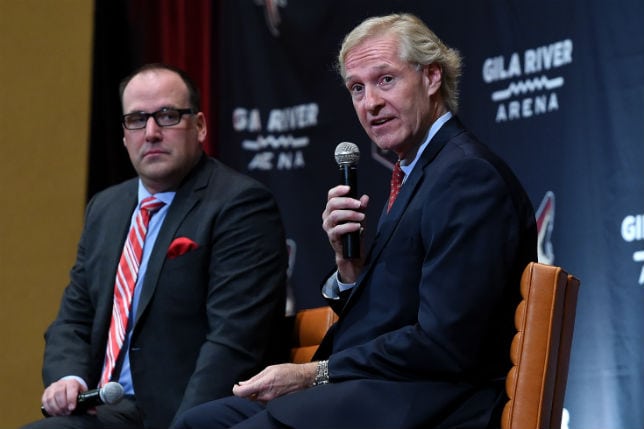
GM Don Maloney lost front-office power struggle in Arizona
Don Maloney guided the Arizona Coyotes through some of the most tumultuous times any NHL team has ever seen and built up a stable of prospects and young players that was the envy of the rest of the league.
 GM Don Maloney lost front-office power struggle in Arizona
GM Don Maloney lost front-office power struggle in ArizonaNow that Don Maloney has been ousted after laying an enormous amount of groundwork for the future success of the Arizona Coyotes, someone else will now come in and get most of the credit. And make no mistake, Maloney’s firing will signal an about-face in how the Coyotes run their hockey department.
Under Maloney, the Coyotes did things the right way, building up a stable of draft picks and prospects with terrific drafting and trading of veterans. But now, essentially because coach Dave Tippett won the power struggle that cost Maloney his job, the mandate will be to win immediately. “Now, they’re going to do it the stupid way,” said one NHL executive.
Speculation as to a successor has already begun, with Dallas Stars assistant GM Les Jackson emerging as an early candidate to replace Maloney. Jackson has been around the NHL in a management capacity for almost 30 years now and would be a good choice to take the Coyotes to the next level. But it still sticks in the craw that Maloney was handed his walking papers. Who in hockey could have taken the situation with the Coyotes and done a better job than Maloney has done to this point?
As I sit here writing this, I’m trying to come up with exactly what it was that Maloney did that merited him getting fired. Crickets. Can’t come up with any. Maloney, who guided this franchise admirably through some of the most tumultuous waters any NHL team has ever seen, was never secret about his intention to build this team the right way. He got Anthony Duclair, a second-rounder and a first-rounder for Keith Yandle. He traded away Antoine Vermette and Zbynek Michalek and got Klas Dahlbeck, a first-rounder and prospect Maxim Letunov in return, then, get this, he got both of them back. He signed star defenseman Oliver Ekman-Larsson to a long-term deal that is looking better for the Coyotes with every passing year. In our annual Future Watch edition, the Coyotes were ranked as the No. 1 franchise in the NHL and much of that was because of Maloney’s moves.
To really get to the bottom of why Maloney was fired, you actually have to look at the top, as in ownership. When Andrew Barroway bought into the team, originally 54 percent worth, that was a good thing for Maloney because Barroway shared his vision of building a team with proper drafting and developing. But trouble started brewing when Barroway got a case of the shorts and had to download some of his shares in the team to Gary Drummond. While Barroway still owns more shares than anyone else, Drummond’s voice got louder and Barroway’s got softer after that transaction. Word is that Tippett allied himself with Drummond and convinced ownership that the plan needed to be fast-tracked.
And that’s what you get when you have a team that has that many owners and not one steady hand at the till. You get factions of people who want to do things one way and factions that want to do it another and conflict is invariably the result. So are palace coups and this move was one of those.
Dave Tippett is a coach, one of the best in the business. He’s tired of all the losing and feels it’s time for the Coyotes to fast-forward the process. It’s hard to blame him for that. He’s a coach in a business where coaches are measured by their wins and losses, not by whether or not the organization is moving in the right direction and one day might ultimately get there. But the days of keeping the powder dry for the future are almost certainly done in Arizona, replaced with a ‘win-now’ attitude.
But that was never part of Maloney’s mandate. He was constantly hamstrung by bankruptcies and legal battles and the uncertainty that came with that. His budgets didn’t allow him to spend on big-money free agents, so what other route was he going to take? Things are most certainly on the right path in Arizona, on the ice at least. And Maloney will be able to take some solace in the fact that when things do turn around, he’ll have had a major hand in making that happen.